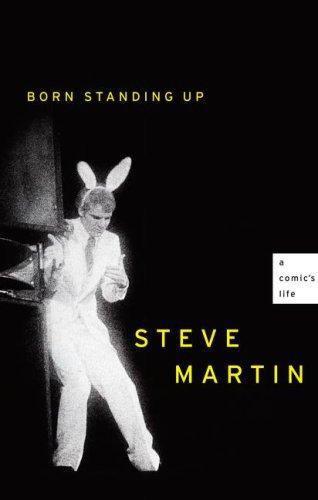
Born Standing Up: A Comic's Life
by
Steve Martin
Published 20 Nov 2007
Speaking with Ives’s son-in-law, George Tyler, we learned the peculiar fact that Ives was an avant-garde composer by night and an insurance agent by day. After a detour to Cambridge, Massachusetts, to cruise the home of my idol cummings, we drove in to glorious Manhattan. Saucer-eyed, we hustled over to the Museum of Modern Art, where we saw, among the Cézannes and Matisses, Dalí’s famous painting of melting clocks, the shockingly tiny The Persistence of Memory. We were dismayed to find that Warhol and Lichtenstein had not yet been ordained. We drove to Eighth Avenue, and Phil circled the block while I retrieved from the imposing central New York post office a lively and welcome letter from Nina, sent to me care of General Delivery, New York City.
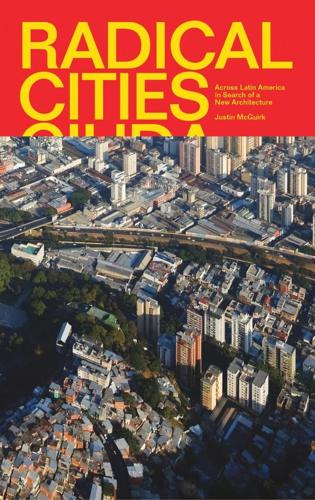
Radical Cities: Across Latin America in Search of a New Architecture
by
Justin McGuirk
Published 15 Feb 2014
The walls generally are fissured. Piedrabuena is a prime site for lovers of modernist ruins. Inevitably, they shoot hip-hop videos here. Part of the appeal must be the murals. Luciano takes me on a tour of them, mostly passable renditions of art-historical masterpieces. Guernica and Hokusai’s wave are here, as are Dalí’s melting clocks. They are the works of a local artist known as Pepi, who has since moved out of Piedrabuena. In front of an ersatz version of Goya’s Execution of the Defenders of Madrid, Luciano says: ‘Normally if you want to see this painting you have to pay to get into a museum, but we can just sit here and enjoy it with a beer.’
…
With that act, he transformed a piece of armour into a symbol of compassion. Such alchemy takes talent. It may derive from his mother, Nijole, a celebrated sculptor, whom he idolises. In fact, she lives next door. Showing me around his mother’s studio, he says, ‘One day my mother said to me, “You’re like Dali, you can make art from anything, but you need cameras!”’ If artists in the 1970s were taking art out of the gallery and into the landscape, then perhaps Mockus can be seen as an extension of that exodus, making art a tool of public policy. Either way, his actions have influenced artists who have returned them to the context of the gallery.
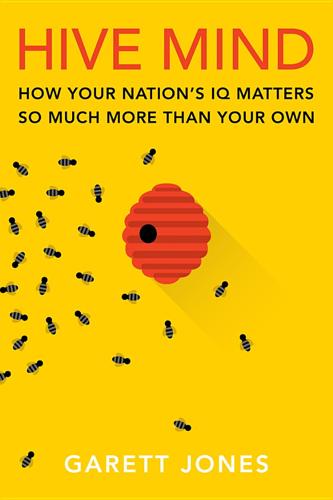
Hive Mind: How Your Nation’s IQ Matters So Much More Than Your Own
by
Garett Jones
Published 15 Feb 2015
And next we’ll see that as the puzzle fades, the frugal literally will inherit the Earth. Patience Is a Virtue Economists have a sense of humor. When Harvard’s Robert Barro and Columbia’s Xavier Sala-i-Martin wrote their textbook Economic Growth, they put a Salvador Dali painting on the cover: melting trees, melting clocks, melting mountains.13 It’s a little bit crazy, like many of the best economic ideas. The melting clocks are especially appropriate to this chapter. For patient people, time just seems to melt away, with the future feeling almost like the present. For the impatient, worrying about the future seems as unrealistic as any abstract painting: impatient people seize the day, carpe diem, they give no thought for the morrow.
…
Along these lines, Rohini Pande of Harvard’s Kennedy School took the time to review all the major studies—including real field experiments run across the developing world—that addressed a precise question: she wanted to see if giving information to voters would improve government quality.13 You can probably guess the answer she came to—in good academic style, it was a “Yes” with caveats—but just as important as her review of the studies is her discussion of why informed voters matter. She emphasizes one key channel, quite different from the more ideological channels that Caplan discusses. Pande argues that informed voters can hold politicians accountable: they remember if the politician was corrupt, effective, scandalous, whatever. Recalling the famous Dali painting with the melting clock—the one on the cover of Barro and Sala-i-Martin’s textbook—let’s call this the “persistence of memory” channel.14 As one piece of evidence she discusses a classic study by economists Ferraz and Finan of Brazilian government audits: Brazil’s central government mandated audits in some regions but not others, and so Ferraz and Finan could compare how voters treated incumbent mayors both pre- and post-audit, as well as between audited and non-audited regions.15 Yes, the audits mattered, but it also turns out that radio mattered: radio, that key source of low-cost information for so many people around the world.
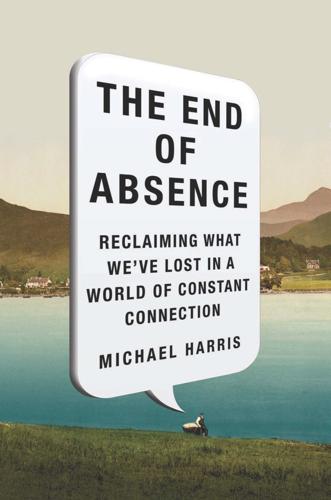
The End of Absence: Reclaiming What We've Lost in a World of Constant Connection
by
Michael Harris
Published 6 Aug 2014
(Yet I remember the flavor of ice cream my childhood buddy once threw a tantrum over—Tiger.) I’ve come to think of my memory lapses in terms of a barren mental landscape. What I want is a city full of memories that I can walk through, full of details I can note and well-stocked shops I can peruse. What I have instead is a desert by Dalí, composed mainly of whistling empty space and the occasional melting clock. I survive on digital cues—my phone is an able secretary, prompting me with reminders and calendars and notes about names of husbands and wives covertly inserted on “contact cards”—but the facade crumbles quickly around Kenny, who knows me better. “How can you ask whether I’ve seen that movie?”
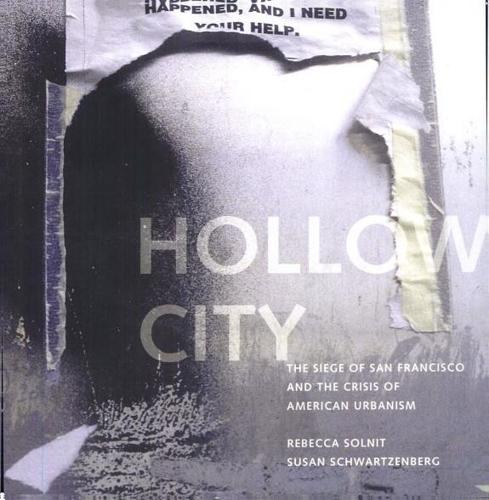
Hollow City
by
Rebecca Solnit
and
Susan Schwartzenberg
Published 1 Jan 2001
long ago in what must have been the mid-1980s, books, served mostly lattes and bagels. clothes and his face painted red under A this Carlos the guy was the great who owns it a big it as remem- when it had walls of sombrero used to a drift through dozen years ago, put cafe of the Mission thought he'd make it, "It back in the 1980s and then it Almodovar posters and melting clocks on the chosen I first sinewy old wacko with tattered As Keating, who moved to San Francisco used to be He slurs. which was one of the in the Cafe Picaro, cafes in the Mission District ting table in Keating talks rapidly, with key phrases that surface again and again in hair, it.
…
in James Brook, Chris Carlsson and Nancy Peters, Reclaiming San Francisco: History, Culture (San Francisco: City Lights Books, 1998). Anders Corr, No Trespassing: Squatting, Rent Strikes, and Land Struggles Worldwide (Boston: South Press, 1999), 18. Ruth Glass, cited in Neil Smith, (London: Routledge, 1996), 17. 2000. For more on the LHotel struggle, see James Sobredo, "From Manila Bay to Daly City: Filipinos San Francisco," End March my brother David Solnit, a co-organizer of the tours, on the Reshaping San FranCD-ROM produced by Chris Carlsson and mentioned in Lucy Lippard's On the Beaten Track. cisco in Francisco, 13. The New Urban Frontier: Gentrification and the Revanchist City 32.
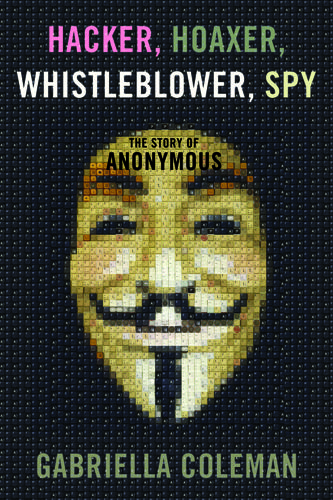
Hacker, Hoaxer, Whistleblower, Spy: The Story of Anonymous
by
Gabriella Coleman
Published 4 Nov 2014
As he sailed along in the Anonymous ship, he accrued new skills: security protocols, and database and webserver management. But “the biggest things I learned,” he says, “were not technical. Teamwork and organization are massive.” He was one—among four I met—of those organizers and brokers essential to making Anonymous’s clock tick, a device which resembled Dali’s gooey melting clocks more than a Swiss machine. For much of the fall of 2010, Adnon was an avid spectator on IRC, only occasionally chipping in on organizational matters. But he chatted, especially with other channel operators such as joepie. Finally, late in December, Adnon finally pitched a proposal, aided by those he had talked to for long hours.